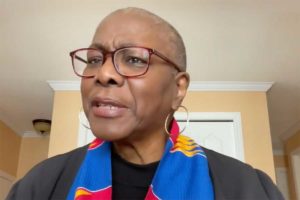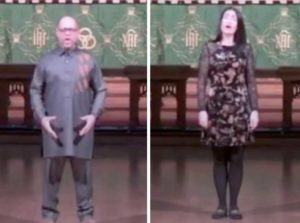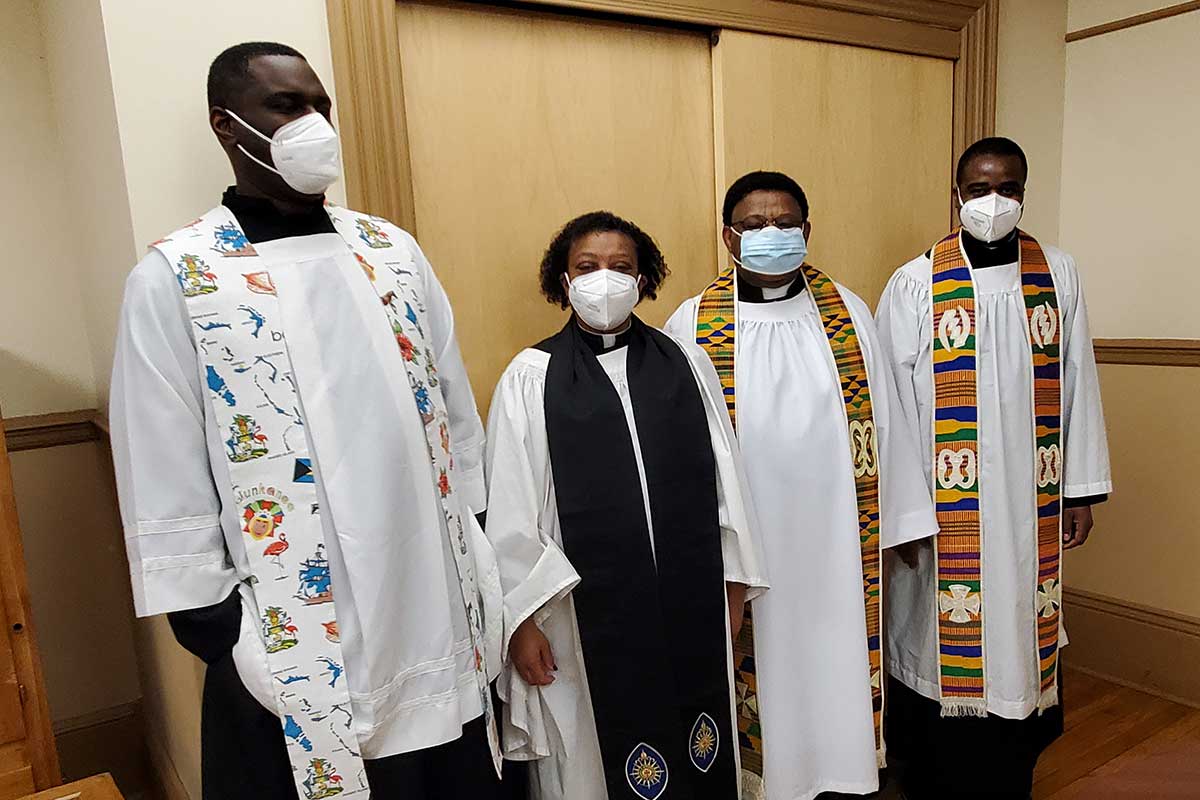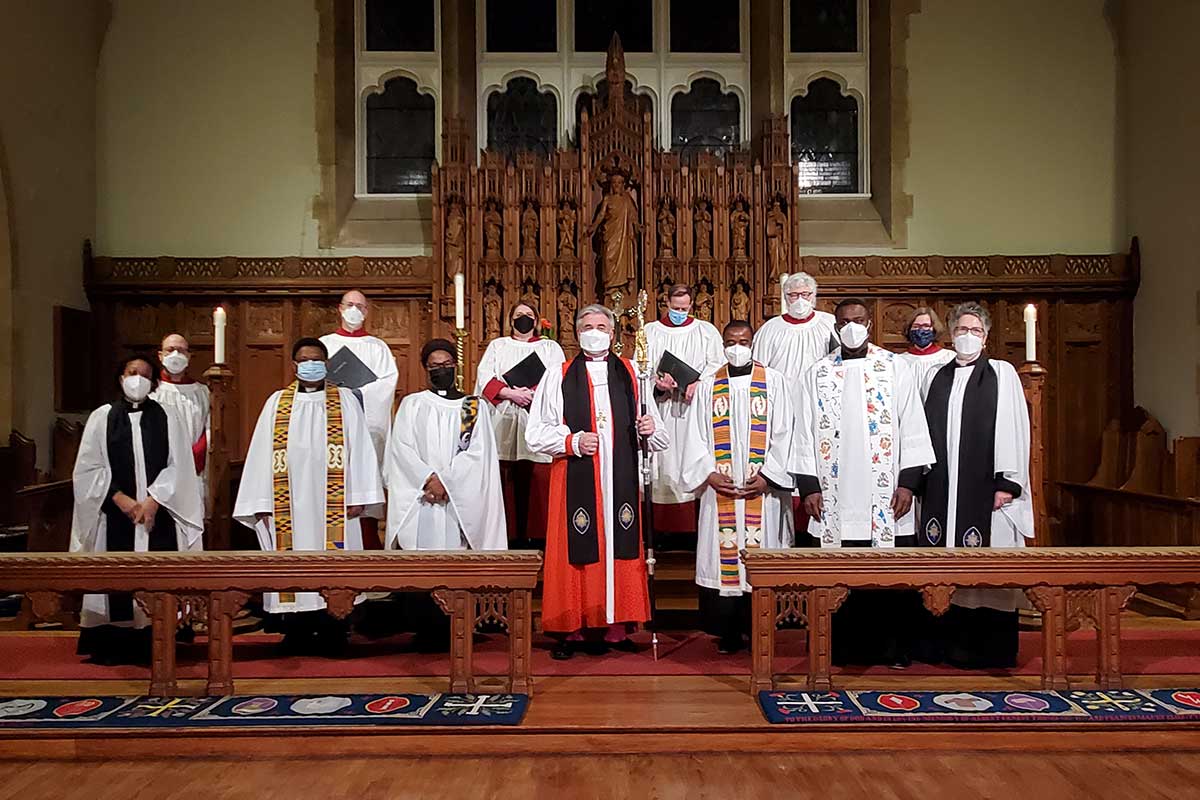The diocesan service to mark Black History Month 2022 was originally planned as an in-person service to be held at Christ Church Cathedral on Feb. 19, a joyful change from 2021 when the whole service had to be online due to the pandemic.
The Rev. Nash Smith says COVID still made planning the service a tough slog for the committee of five Black clergy, but “we overcame that, unaware of the protesters coming to Centretown.” The streets around the Cathedral were suddenly blocked.
The service had to be pre-recorded and broadcast a week later on Feb. 26, but Smith said, with great support from Bishop Shane Parker and Dean Beth Bretzlaff, the cathedral musicians and participants all working together, it all came together “brilliantly.”
And so, the 2022 diocesan service took on a theme often spoken of in Black History Month: resilience in the face of obstacles. The service was held, the Gospel proclaimed, Dr. Joy Mighty delivered a powerful sermon, and voices were raised beautifully in song.
The service was dedicated to the memory of the late Archbishop Desmond Tutu, described in the Rev. Nash Smith’s tribute as “an Anglican clergyman who became the moral conscious of South Africa and the world. He was the backbone of the black struggle for equality in his homeland during the apartheid era in South Africa. He was a selfless advocate and fighter for justice, equality, freedom for all, and an apostle for the peaceful co-existence of the people of South Africa.”

Dr. Joy Mighty, a Professor Emerita and former associate vice-president from Carleton University, began her sermon by congratulating the Diocese of Ottawa for publicly observing Black History Month. She noted some of the themes selected in 2022. The Diocese chose Acknowledging and Embracing Diversity, while the Government of Canada’s official theme was “February and Forever, Celebrating Black History today and every day.”
Mighty reminded her listeners that observing Black History Month is “not only about celebrating the number of Black firsts or the excellence of Black contributions to civilization. It is about encouraging us to accept the reality of the history of Black enslavement, colonization, and other forms of oppression. It also urges us to face the truth about the prevalence of anti-Black racism today.”
Canadians like to distance themselves from the “extremes of anti-Black racism that we far too often see displayed in the U.S. especially in the killings of Black men and women by white police,” Mighty said, but added, “we cannot pretend it doesn not exist here. Not only does Canada have a history of anti-Black racism, but anti-Black racism is still very much alive and well in Canada today.”
Although “the horrific and very public murder of George Floyd in the U.S. on May 25,, 2020 may have been the catalyst for the groundswell of protests in the U.S., Canada and across the world,” she reminded her listeners that it reflected the “reality of what Black people experience every day and have been experiencing for a very long time.” What was new is that many people were “finally jolted awake” to that reality.
The COVID-19 pandemic highlighted and compounded the impact of racism as well. BIPOC communities (Black, Indigenous, People of Colour) were disproportionately affected by the pandemic in terms of number of deaths, majority of job losses, and greater numbers in frontline work, she said. “Even without the pandemic, statistics tell us that Blacks in Canada are more likely to have lower employment rates, less household wealth, lower earnings, less access to good housing, education and other services.” This is particularly true for Black immigrants, she added.

Mighty shared a line from award-winning Black Canadian author Ian Williams’s book Disorientation, which describes the impact of daily expressions of micro-aggression and other forms of racism: “Black humans are wired like all humans to bruise from injustice, from affronts to our dignity, our good intentions, our reputation.”
It’s difficult for those who do not experience this disorientation to understand its destructive impact, Mighty said. “I know that not all Blacks are comfortable talking about such experiences, but sometimes by our silence we encourage other people to define us and our experiences only in their narrow ways.”
There is an African proverb “Until lions write their own history, the tale of the hunt will always glorify the hunter.” It explains the omission of Black experiences from history books, “which tell stories about us only from the perspective of white colonizers or which only record the so-called “exotic” aspects of the Black experience such as colourful dress, tasty foods, lively music and expressive dance,” Mighty said. “As delightful as these are, we are so much more…, so we have to tell our own stories, our own truths, and Black History Month gives us a perfect opportunity to do so. In fact, we have our responsibility to do so.”
But others also have a responsibility, Mighty said. “What are the implications for Blacks and non-Blacks of knowing the whole truth?
As people of faith, how do we respond to the reality of Black history?…It’s all well and good for us to celebrate Black history once a year in February but how do we acknowledge and embrace such diversity in our daily lives?”
She referred to the question white scholar Peggy McIntosh asked at the end of her now famous paper on white privilege. McIntosh asked her colleagues to consider how they would “use their unearned privilege to help reconstruct the unequal power systems in our society.”

The best guidance for all of us, Blacks and non-Blacks, Mighty said, comes from the Gospel reading from Matthew when Jesus said: “You shall love the Lord your God with all your heart, with all your soul, and with all your mind. This is the first and the greatest commandment, and the second is like it. You shall love your neighbour as yourself.”
“As we reflect on how we can love our neighbours as ourselves, I earnestly encourage the church to explore ways of demonstrating this same neighbourly love, expressly targeted to our Black communities,” she said.
She ended her sermon with this prayer:
Let us give thanks for our faithful ancestors who’ve gone on before us
Let us pray for the souls of the countless millions who lost their lives in the middle passage during the evils of the transatlantic slave trade
And let us lift up all those who have suffered under the colonization and suppression of their cultures, including our Indigenous brothers and sisters of this country
May we remember and give thanks for the many who have taken a stand for peace and justice
May we too have the courage to speak out and shine a light on the needs of the oppressed, on social injustice, poverty, inequality and ecological injustice
May we strive to combat racism, racial discrimination, xenophobia, and related intolerances
And may we strive to become a more culturally sensitive, racially inclusive, and justice conscious congregation and society…
In a few moments, we will recite the Creed. As we recommit to following Jesus’s example in loving our neighbours as ourselves, striving for justice and peace among our people, and respecting the dignity of every human being
May our prayers become a catalyst rather than a substitute for action
And in striving to honour these vows, may we enact Jesus’s commandment to love our neighbour as ourselves, as our official theme states, not only in February but forever, not only today, but every day.
Amen
Bishop Shane Parker offered this blessing:
“God, who created us in the divine image, sends us out: to tear down the walls which divide us and to build lives of trust among all God’s children, that we may dance together with joy in God’s kingdom.”



An abiding sense of thanksgiving